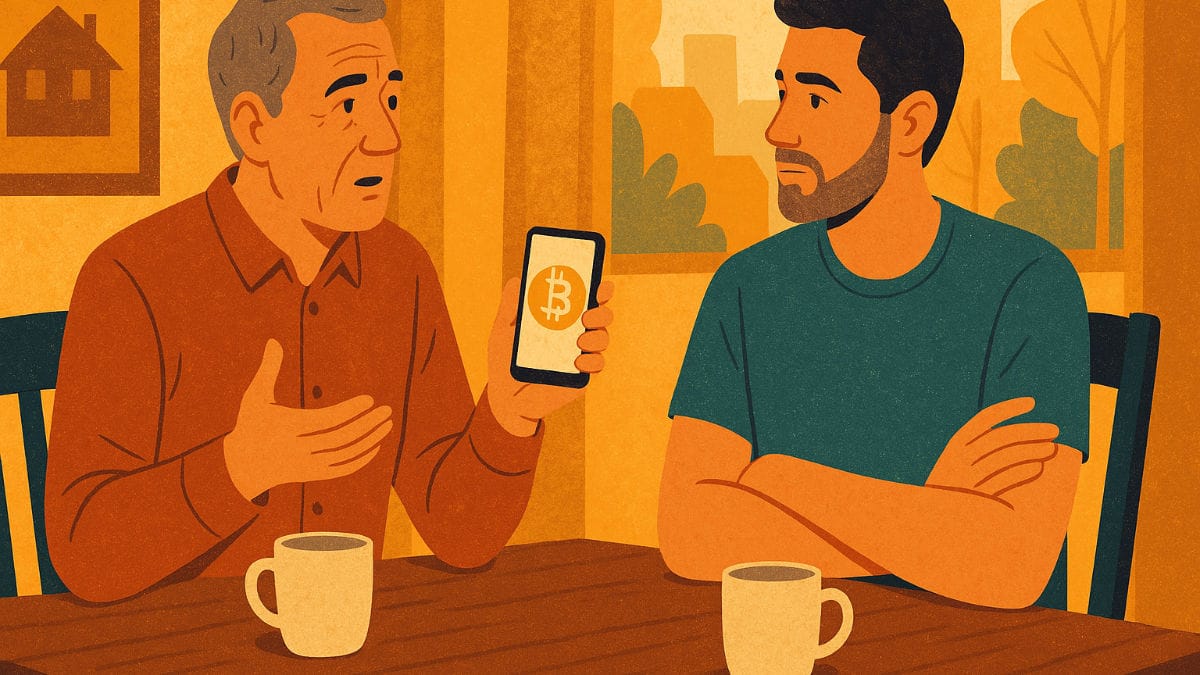If Only You Had Listened!
What’s driving your investment fate—personal history or market forces? Erik pits renting vs. buying, Bitcoin’s resilience against stock market chaos, and Trump’s bold tariffs. When in doubt, zoom out. Is uncertainty the only constant?

Erik
The book The Psychology of Money has made an appearance at Bitcoin Alpha before. “When in doubt, zoom out” is a phrase often used by traders and analysts—and that’s one of the book’s strengths: it provides a broad perspective on the role of money and investing in your life. In Morgan Housel’s bestseller, he explains why people often talk past each other when it comes to investing or trading: they were shaped by different eras.
“Arrange your financial life in a way that a bad investment here and a missed financial goal there won’t wipe you out so you can keep playing until the odds fall in your favor."
— The Psychology Of Money (@Psy_of_Money) January 7, 2023
- The Psychology of Money
Personally, I—Erik—am a man in my forties who has never bought a house, much to my dear parents’ dismay. For them, baby boomers who built their affluence in part by purchasing a home in the early seventies for barely more than half a million guilders, it’s hard to understand why anyone wouldn’t want to own a home. And that their son stubbornly continues to rent...
On the other hand, I have spent the past five years trying to convince my father of bitcoin’s benefits, necessity, and investment potential. Father: “If only you had bought that apartment in Amsterdam back in 2006…” Son: “Your savings are rotting away; you should have put them in BTC in 2020, just as I advised you.”
What’s going on here? Housel cites a study concluding that investors’ decisions are heavily influenced by the economic conditions and investment climate of their formative years. People who were young adults during the crisis of the thirties understandably developed a lower appetite for risk compared to those who came of age during the booming fifties and sixties. If you grew up in a bull market for stocks, you’re likely to maintain a higher willingness to invest in them throughout your life—even if that approach eventually becomes less justifiable.
My own background might explain my risk-taking with BTC; I grew up during the tech stock bull market from the late nineties until now. It conditioned me to believe that simply holding on and buying the dips in relatively risky stocks can pay off. Perhaps it also explains my father’s obsession with home ownership. He’s only experienced rising house prices; the era of stagnant housing prices familiar to his parents is simply not on his radar.
What stocks did in your teens and 20s based on what year you were born. (Adjusted for inflation and dividends) pic.twitter.com/gm6kpfsKRX
— The Motley Fool (@themotleyfool) June 2, 2019
Housel writes:
In theory, people should make investment decisions based on their goals and the characteristics of the options available at the time. But that’s not what actually happens. The findings suggest that individual investors’ willingness to take risks depends on personal history. Not intelligence, education, or sophistication—just the luck of when and where you were born.
So be cautious about whose investment advice you follow. So-called secular bull markets for stocks, bonds, or gold can last for decades and then be replaced by long periods of downturn. What is the value of advice from someone who has enjoyed decades of favorable tailwinds for their favorite investment just before conditions change?
This reflection is especially timely now that we might be approaching a macroeconomic tipping point. Age-old investment adages no longer seem to hold. The US national debt is becoming unsustainable, the decades-long bond bull market appears to be over, the classic 60/40 portfolio rule (60% stocks, 40% bonds) is increasingly difficult to defend, and a strange new asset class—crypto—has entered the arena.
For my father, for me, and for every investor, navigating this environment feels like an adventure. A little humility never hurts. When in doubt, zoom out. Recognizing that everyone is shaped (or slightly misshaped) by their own circumstances makes it easier to step back from your biases and build a portfolio that partially hedges against the possibility that you may be wrong about your primary investment thesis.
Maybe I should have bought that apartment back then. And perhaps my father should have invested ten percent of his savings in BTC!
Are you a Plus member? Then we move on to the following topics:
- Is the dollar an exorbitant burden?
- Bitcoin’s ‘decoupling’: winning first, then celebrating
- Heavy losses for DeFAI and DeSci
